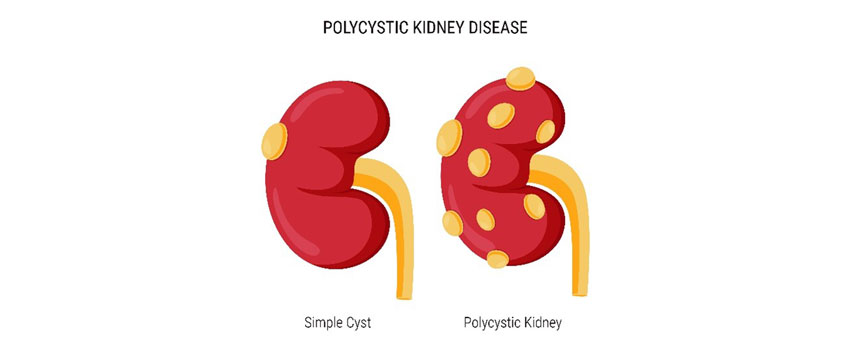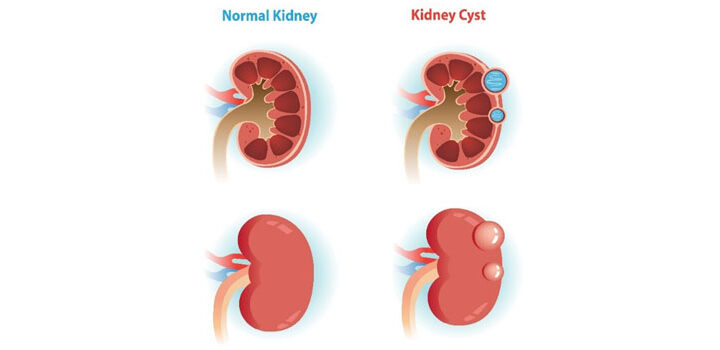Kidneys are bean-shaped organs that filter waste out of your bloodstream to produce urine. They also help balance the fluid and salts in your blood. Simple kidney cysts are fluid-filled sacs or cysts, that can form in one or both of your kidneys and are usually harmless. There can be only one cyst or many. The shape of simple kidney cysts is generally round or oval. Simple kidney cysts can be from the size of a pea to the size of a golf ball.
There are two types of cysts:
- Simple cysts
- Polycystic kidney disease

In simple kidney cysts, kidneys do not enlarge, replace their normal structure, or cause reduced kidney function like in cysts with polycystic kidney disease (PKD). PKD is a genetic disorder that can cause chronic kidney disease which tends to run in families and can be more serious. Over time with PKD, your kidneys do not work as well, and the disease can lead to kidney failure.
Sometimes cysts can be formed in your liver or other parts of your body because of PKD.
The exact cause of simple kidney cysts is not known but they tend to be more common as people grow older.
They hardly need treatment. Most people do not even know that they have simple kidney cyst until you get an imaging scan for another reason. Small, asymptomatic cysts usually do not require any treatment and are monitored over time. Large or symptomatic cysts can be drained or surgically removed, if necessary. In some cases, your doctor may prescribe medication to help shrink the cyst.
Diagnosis
Along with a physical exam, your physician may use several tests to help diagnose kidney cysts.
Below are tests and procedures to diagnose simple kidney cysts:
- Imaging tests- To diagnose simple kidney cysts, imaging tests such as MRI, CT, and ultrasound are done. Imaging tests can help diagnose whether a kidney mass is a cyst or a tumor. A specially trained technician performs imaging tests, and a radiologist or nephrologist reviews the images. You do not need anesthesia for these tests, but the physician may give you light sedation.
- Kidney function tests-Blood and urine tests can also be done to determine if simple kidney cysts are impacting kidney function. Your physician may just monitor them regularly if the kidney cyst is not causing any problems or symptoms.
- Ultrasound- Simple kidney cysts can be found by abdominal ultrasound by creating images of your kidneys. A device called transducer is used for ultrasound, which bounces safe, painless sound waves off your organs to create an image or picture of their structure.
What are the symptoms and complications of simple kidney cysts?
Simple kidney cysts tend to grow bigger and grow in number, as a person ages. However, simple kidney cysts do not generally cause symptoms or additional health problems.
If the cyst becomes large or becomes infected, it may cause below symptoms:
- Pain in your back or side, between your ribs and pelvis
- Frequent urination
- Pain in your upper abdomen
- Swelling of the abdomen
- Fever, chills, or other signs of infection
- Blood in urine
- High blood pressure
- Dark urine
Talk with your healthcare professional if you have any of these symptoms.
PKD can cause symptoms as follows:
- High blood pressure
- Blood in urine
- Urinary Tract infections (UTI)
- Headaches
- Kidney stones
- Pain in your back or side
Complications
Kidney cysts may sometimes lead to complications, which may include:
- An infected cyst- Infected kidney cysts may cause fever and pain.
- A burst cyst-A kidney cyst that bursts can cause a lot of pain in the back or side. Sometimes a burst cyst may even cause blood in the urine.
- Blocked urine flow-A kidney cyst that causes kidney swelling may block the typical flow of urine.
Treatment
Treatment may not be needed if a simple kidney cyst causes no symptoms and does not affect kidney function. Your physician may recommend that you have imaging tests, such as ultrasounds, to check whether your kidney cyst changes, over time.
You may choose to have treatment if your kidney cyst changes and causes symptoms. Sometimes a simple kidney cyst goes away on its own.
Treatments for cysts that cause symptoms-
If a simple kidney cyst is causing symptoms, your physician may recommend the treatment below. Options include:
- Piercing and draining the cyst, then filling it with a solution. The solution is helpful for preventing the cyst from filling with fluid again. The solution may consist of alcohol or a chemical compound.
In a few cases a long, thin needle may be inserted through your skin and through the wall of the kidney cyst to shrink the cyst. Later to prevent the cyst from rebuilding, the fluid is drained from the cyst and filled with a solution.
- Surgery to remove the cyst. Surgery may be required for large cysts that are causing symptoms. To access the cyst, the surgeon makes several small incisions in your skin and inserts special tools and a small video camera.
The surgeon guides the tools to the kidney and uses them to drain the fluid from the cyst while watching the video monitor in the operating room. Then, the walls of the cyst are cut or burned away. Surgery is hardly performed for simple cysts. The procedure is more often used for complicated cysts with changes that may be cancer.
For some procedures, a brief hospital stay may be required to treat a kidney cyst.
You may be concerned if a simple kidney cyst is investigated during an imaging test for another disease or condition. You can learn from your physician about what having a simple kidney cyst means for your health. Having relevant knowledge may help put your mind at ease and you will feel more in control of your situation.
To schedule an appointment with us, please visit – https://clinicalrenal.com/all-locations/. We are dedicated kidney specialists serving Southeast Pennsylvania for over 40 years.

